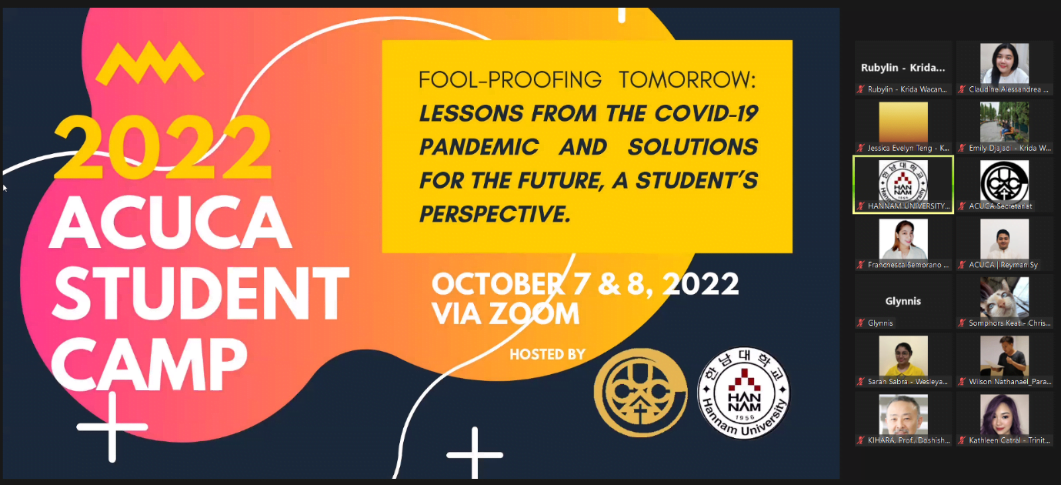ACUCA hosts a Student Camp every two years as a venue for students from the 65 member institutions to come together and experience the richness of conversations about culture, environment, equality, faith, and religion from a Christian perspective. The most recent Student Camp was held in 2018, hosted by the Christian University of Thailand, with students from member institutions throughout Asia flown into Nakhon Pathom, Thailand. There were plans for a Student Camp in 2020, but they had to be shelved as the world dealt with the still-active COVID-19 pandemic.
After a four-year hiatus, the Student Camp is back in a new form: an online gathering of learners and educators, informative discussions, lectures, games, and network-building. For the first time, the ACUCA Secretariat organizes the Student Camp with the assistance of eight students from different member institutions mirroring the composition of the ACUCA ExCo.
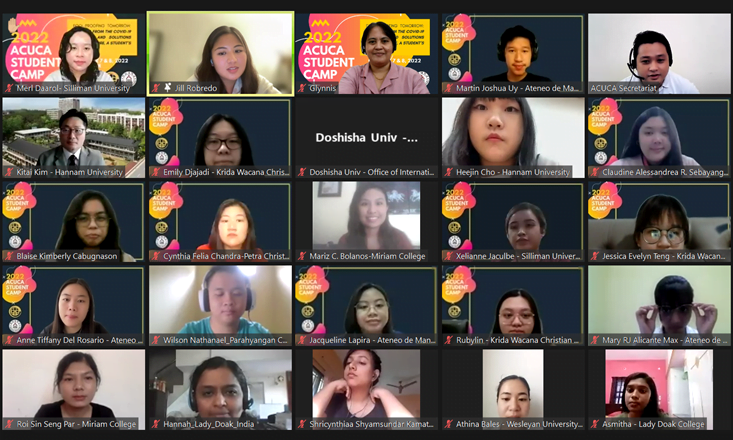
The Opening Devotion led by Hong Kong Baptist University kicked off the first day of the Camp. Following that was a Creative Introductions segment in which participants created unique ways to introduce themselves, similar to Tiktok and other short-form media. Following the introductions, the Plenary Session began with a segment aptly titled “ACUCA in Retrospect,” a look back at the association’s decades of history, from its inception to its relevance today, narrated by Dr. Betty McCann, the immediate past ACUCA President. The Wesleyan University – Philippines Chamber Singers then led the singing of the ACUCA Hymn. Following that, Dr. Kwang-sup Lee of Hannam University, President of ACUCA, formally opened the two-day Student Camp with welcoming remarks that focused on moving forward in a post-pandemic world, as well as highlighting the significant role that students play in shaping ACUCA’s future.
The final part of the Plenary Session was the keynote speech delivered by Miss Jillian Therese Robredo, a recent graduate of Economics and Mathematics at New York University and an analyst in a New York-based consulting firm. She began her speech with a flashback to the days leading up to the worldwide lockdown and a relatable story about how most people thought the pandemic would only last a few weeks. Robredo’s speech emphasized the importance of “building communities even from a distance” and how these communities can serve as a support system, particularly during difficult times. Following the Keynote Speech, there was an Open Forum in which Robredo answered a few questions from the audience.
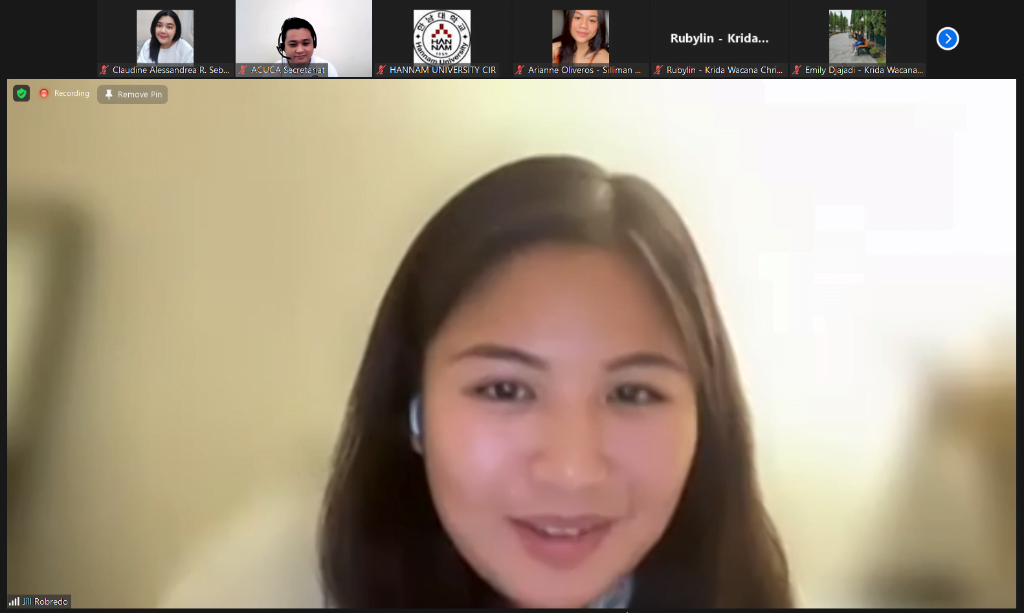
The participants were able to interact with each other during the afternoon session of the first day of the Camp by first playing some interactive games via Kahoot! , a game-based online learning platform. Following the games, the participants were given the opportunity to freely converse with one another during an unmoderated networking session, bringing the activities for Day 1 to a close.
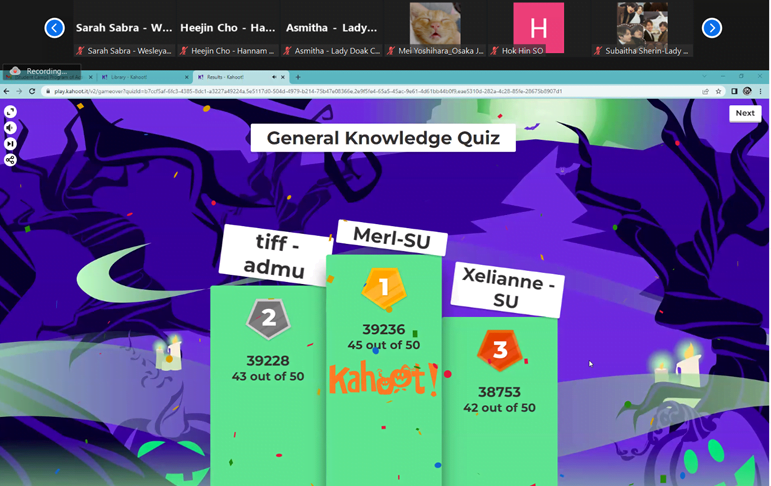
The second day of the Student Camp began with a solemn Invocation led by the Christian University of Thailand. Following that, a live checking-in activity with the participants allowed everyone to get a sense of the mood of the morning. During the check-in, they were asked how they were feeling at the time and were asked to call on a new friend among the participants whom they had met the day before during the networking session; this continued until everyone had a chance to speak. Miss Aprille Juanillo, an environmentalist and writer who currently heads the media and communications operations of a Philippines-based youth-led organization, delivered a talk on “Fool-Proofing the Future” immediately after.
Her lecture focused primarily on social equity, education, and the environment as key areas identified to ensure that the youth is prepared and well-equipped in the event of another calamity on the scale of COVID-19. Juanillo emphasized the undeniable importance of the environment in all human activities, urging participants to advocate for “immediate climate action” and “integration of environmental education in formal education,” among other key points, and even normalizing the topic of the environment in everyday conversations. Following the discussion, there was an Open Forum where participants could ask questions.
The Student Camp also provided attendees with a floodgate of incredible opportunities as they listened to Dr. Jenny Lind Elmaco’s session on Scholarships. Dr. Elmaco, a university professor and expert in peace, security, and conflict management, joined the Camp from Brussels, Belgium, and currently heads the South East Asian office of the European Commission’s research-funding initiative, EURAXESS. Dr. Elmaco’s presentation touched on existing partnerships between European and Asian institutions, many of which have enabled exchanges and fellowships. She also went into great detail about the vast network of organizations that provide aid for a wide range of needs, such as graduate and post-graduate studies, scientific and academic research, publications, and academic fellowships, among many others.
Following the conclusion of the final lecture, the participants were treated to short video presentations prepared by selected participants, including those from Hong Kong Baptist University, the Christian University of Thailand, and Lady Doak College, who gave the participants a glimpse of their student lives at their respective universities. This was followed by a short message from ACUCA’s Secretary-General, Professor Kitai Kim, and then the Closing Remarks by Professor Tomoko Ueki of Doshisha University, who currently serves as the association’s Vice-President; both conveyed messages of thanks and appreciation to the Student Camp attendees, speakers, and organizers. Mr. Sho Taya of Doshisha University, a member of the organizing team, led a prayer at the end of the two-day Camp.
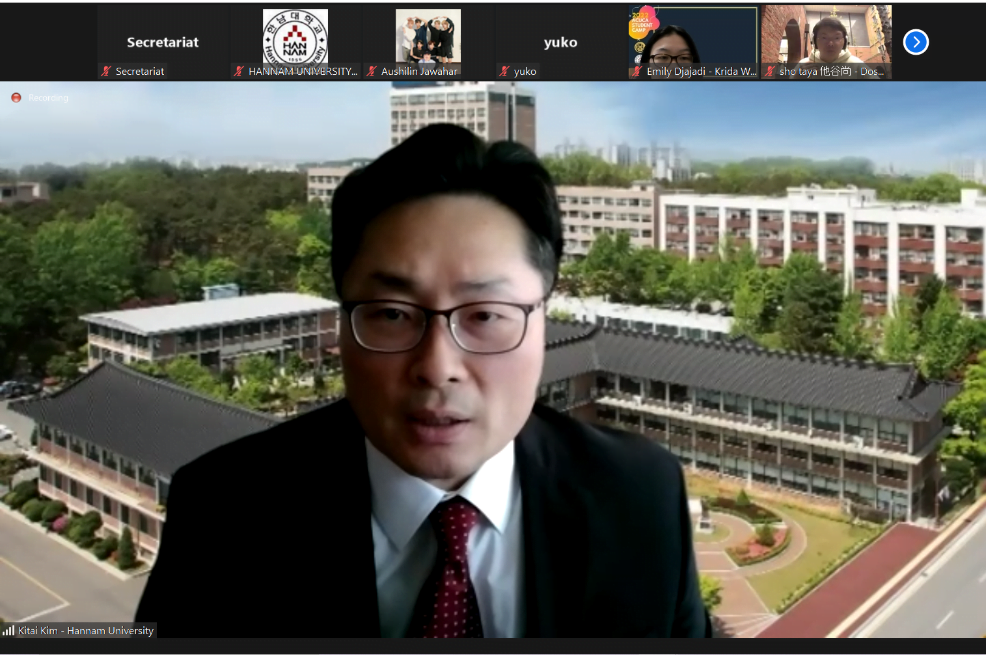
The 2022 ACUCA Student Camp was held via ZOOM last October 7 and 8, 2022 with attendees from member institutions from India, Indonesia, Hong Kong, Japan, Korea, Philippines, Taiwan, and Thailand. The Camp received overwhelmingly positive feedback from its participants, including requests for an extended and intensive in-person camp in the future.

